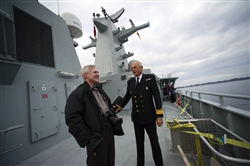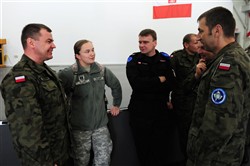Despite the cold: U.S. military partnerships key to Arctic crisis response
ABOARD HRMS JOHAN DE WITT, Norway — Marines with Fox Company 2nd Battalion 25th Marines, 4th Marine Division participate in a Combat Lifesaver Refresher Course Feb. 24, 2010 aboard the Dutch Hr Ms Johan De Witt, where Marines with 4th Recon Battalion and Fox Company 2nd Battalion 25th Marines, 4th Marine Division participate in exercise Cold Response 2010 (CR10). CR10 is a Norwegian sponsored, scheduled, and conducted multinational invitational exercise with the Norwegian armed forces focused on cold weather maritime/amphibious operations, interoperability of expeditionary forces, special and ground operations. Participants include forces from Great Britain, the Netherlands, Sweden, Finland, Germany, Austria and other NATO partners. This exercise, previously known as Battle Griffin, will occur entirely north of the Arctic Circle and will emphasize individual and unit cold weather capabilities. (U.S. Marine Corps photo by Master Sergeant Michael Q. Retana)
U.S. Navy Ship's Serviceman Seaman Recruit Jamal Powell, left, and Seaman Recruit Stephen Harmon stand forward lookout watch aboard the guided-missile cruiser USS Normandy (CG 60) June 12, 2007, as the ship navigates through an ice field in the Arctic Circle north of Iceland.
NUUK, Greenland -- Secretary of the Navy (SECNAV) the Honorable Ray Mabus speaks with Royal Danish Navy Rear Adm. Henrik Kudsk, Island Commander of Greenland, aboard the Royal Danish Navy arctic patrol vessel HDMS Ejnar Mikkelsen (P-571). Mabus concluded a day-two day trip to Greenland, meeting with leaders and scientists to discuss the importance of regional security and the environmental impacts of climate change.
Marines with Company K, 3rd Battalion, 24th Marine Regiment, 4th Marine Division, await to embark Her Netherlands Majesty's Ship Rotterdam here, March 6. HNLMS Rotterdam will take 173 Company K Marines up to Norway's Arctic Circle areas where they will participate in Exercise Cold Response 12, held until March 21. The multinational invitational exercise will focus on rehearsing high intensity operations in winter conditions within NATO with U.N. instructions.
U.S. Marines with Kilo Company, 3rd Battalion, 24th Marine Regiment, 4th Marine Division gather their gear before embarking a Dutch navy landing craft, utility in Harstad, Norway, en route to landing platform dock ship HNLMS Rotterdam (L800) March 12, 2012, during exercise Cold Response 2012. The ship supported the Marines during the exercise. Cold Response is a Norwegian-led exercise to rehearse high-intensity operations in winter conditions. Participants are from 15 NATO nations with the largest group of participants coming from Canada, France, the Netherlands, Great Britain, Sweden and the United States.
Related Topics (5)
More related topics
STUTTGART, Germany – When a cruise ship runs aground in a remote Greenland fjord, is set ablaze and springing leaks, injured passengers must be rescued.
The scenario used during SAREX 2012— a multinational exercise held recently in Greenland’s eastern sea – tested military and civilian capabilities for search and rescue missions above the Arctic Circle. Meanwhile, during exercise Northern Eagle, a U.S. Navy destroyer joined Russian and Norwegian vessels in the Barents Seas to prepare for similar rescues, plus anti-piracy operations and joint air defense.
Lessons from such exercises help U.S. Coast Guard Cmdr. Edward Westfall, who helps plan U.S. European Command’s involvement in upcoming partnership events involving nations with Arctic interests.
“It’s an area of ongoing change that is seeing an expansion of commerce,” Westfall said. “More activity going on up there raises the potential for disasters, ships sinking or oil spills.”
The U.S. military divides the Arctic region between two unified commands, Westfall said. U.S. Northern Command oversees Arctic frontiers in Alaska and Canada while EUCOM covers six Arctic nations within its area of responsibility. Any disaster, whether natural or manmade, might require EUCOM to support partner nations’ request for help, Westfall said.
Building strong relationships and creating informal bonds between officers within respective commands is one way EUCOM is working now to support any future contingency. In early September, Ambassador Lawrence Butler, EUCOM’s civilian deputy, met with fellow U.S. ambassadors in Reykjavik, Iceland, to discuss diplomatic strategy in Nordic areas. More specifically, Butler said, they talked about how U.S. and allied militaries might support response missions.
“How will nations respond to a maritime crisis? How will resources from the Danes, Russians, Icelanders and Norwegians be pooled to respond,” Butler said. “To have things in place, we have to start planning today.”
Response capabilities were tested during SAREX 2012. Crews from two U.S. C-130 aircraft -- one from the 109th Airlift Wing, an Air National Guard unit based at Stratton ANG Base, NY and another from the US Coast Guard Air Station Elizabeth City, NC -- were among those who took part in the weeklong mission that concluded Sept. 14. In August, during Northern Eagle, the USS Farrgut, a U.S. Navy Arleigh Burke-class destroyer, trained together with a Russian destroyer and Norwegian coast guard vessel.
Watching closely is Westfall, 46, originally from San Francisco, Calif., who has spent 18 years afloat his nearly three decades of Coast Guard service, often commanding ships on missions for law enforcement missions, navigation aid maintenance and domestic ice breaking. He began Arctic studies last year at the National War College. In early September, he travelled to Bodo, Norway – about 1,100 miles north of EUCOM’s headquarters in Stuttgart, Germany and 750 miles north of the Oslo, the Norwegian capital.
There he attended the Arctic Security Forces Roundtable. Senior officers meet annually in an informal setting. Throughout the year, staff officers use working groups to address issues that arise, Westfall said.
“It’s a forum to share ideas, focusing on communications amongst security forces, domain awareness and just knowing what is going on the Arctic with the increase in traffic,” Westfall said. “It also offers an opportunity for the U.S. military to cooperate with Russia and other partners and allies in areas of common interest.”
Maj. Gen. Mark O. Schissler, EUCOM’s strategy and policy division director, took part in the event, which also included representatives Canada, Denmark, Finland, France, Germany, Iceland, Netherlands, Norway, Russia, Sweden and the United Kingdom. Schissler said the roundtable was a good idea that should be continued.
“Arctic nations still have a long way to go in addressing communication and maritime domain awareness issues,” Schissler said. “The ASFR is a collective step in the right direction.”
Find more articles tagged with:
- partnership
- exercise
- anti-piracy
- air defense
- multinational
- Search and Rescue
- Arctic
- U.S. Coast Guard
-

US, Israel prep for largest ballistic missile defense bi-lateral exercise
Senior leaders for the exercise Austere Challenge 2012 announced the arrival of U.S. troops and equipment in Israel for the event and provided background to reporters via telephone Wednesday from Ramstein Air Base, Germany.Find more articles tagged with:
-

Saber Junction tests U.S., partners’ interoperability
Approximately 1,800 forces from 18 European nations train for the post-Afghanistan fight using the U.S. Army’s most-current doctrine for unified land operations. At the Grafenwoehr Training Area, also called GTA, and Hohenfels Training Area, or HTA, and more than 1,300 square miles in-between installation facilities 2nd Stryker Cavalry Regiment, also known as 2CR, engages a complex enemy.Find more articles tagged with:
-
Civic leaders receive preview of Baumholder's future
Leaders of the U.S. Army Garrison Baumholder, the 170th Infantry Brigade Combat Team and local civic leaders came together for a garrison hosted civic leaders working luncheon recently in the Rheinlander Community Club to discuss issues affecting the military and civilian communities.Find more articles tagged with:
-

USACE forward engineers train with Italians
A U.S. Army Corps of Engineers Forward Engineering Support Team-Advance (FEST-A) conducted training and remote engineering missions in partnership with Italian Army Reconnaissance Engineers here September 9-21, 2012.Find more articles tagged with:
-

EIAMDC officially opens
The Warrior Preparation Center opened the European Integrated Air and Missile Defense Center with a ribbon cutting ceremony here Sept. 26.Find more articles tagged with:
-

Exercise Jackal Stone 2012 leaders, participants honor fallen SF comrade
Military members and civilians from the U.S. and Croatia honored the late Master Sgt. Ivica Jerak, a member of U.S. Army Special Operations Command, with a small memorial service held in his native town of Debeljak, Croatia, Sept. 22, 2012.Find more articles tagged with:
-

Ceremony ends 18th Combined Endeavor
On Sept. 20, a closing ceremony at the Joint Military Training Command on U.S. Army Garrison Grafenwoehr, Germany, ended the 18th year of the world’s largest military communications exercise, Combined Endeavor 2012.Find more articles tagged with:
-

173rd Airborne Brigade, Italian carabinieri share training, experiences
Noncommissioned officers from the rear detachment of U.S. Army Europe's 173rd Airborne Brigade Combat Team shared deployment experiences and lessons learned with Italian military law enforcement officers during cultural awareness and information operations training here, Sept. 11.Find more articles tagged with:
-

Schweinfurt flexes combat capability muscle with NATO exercise
Despite its announced closure earlier this year, the U.S. Army garrison here still has something to prove: Pitted between closing and remaining operational, it can also host a large-scale NATO exercise in its own backyard.Find more articles tagged with:
-

Kansas National Guard partners with HDTC for Humanitarian Demining in Armenia
Four soldiers from the Kansas National Guard are working with a civilian representative from the U.S. Humanitarian Demining Training Center to teach international Humanitarian Mine Action standards to members of the Engineering Companies of the Armenian Peacekeeping Brigades Sept. 18-28.Find more articles tagged with:



















Comments: 0